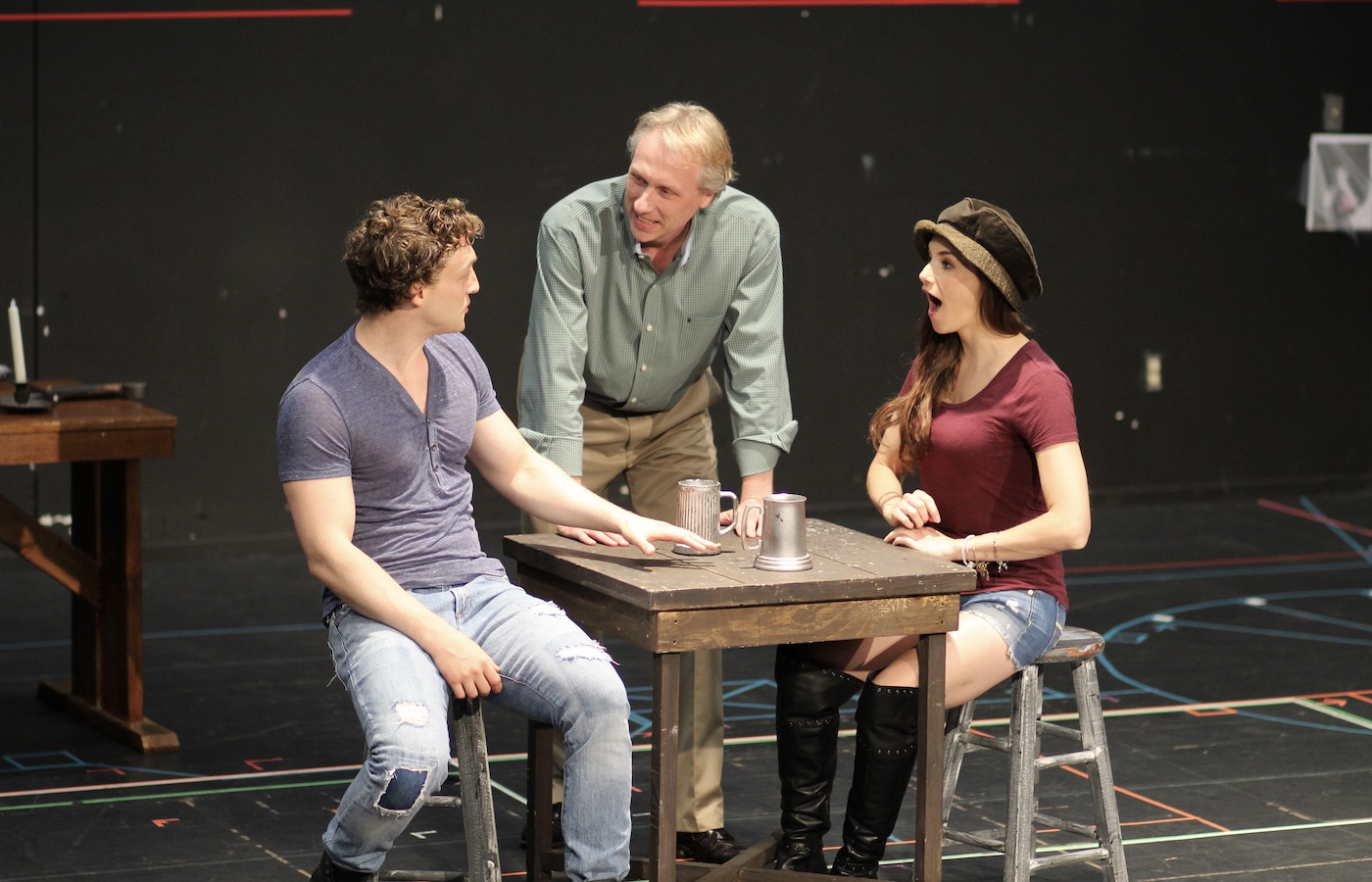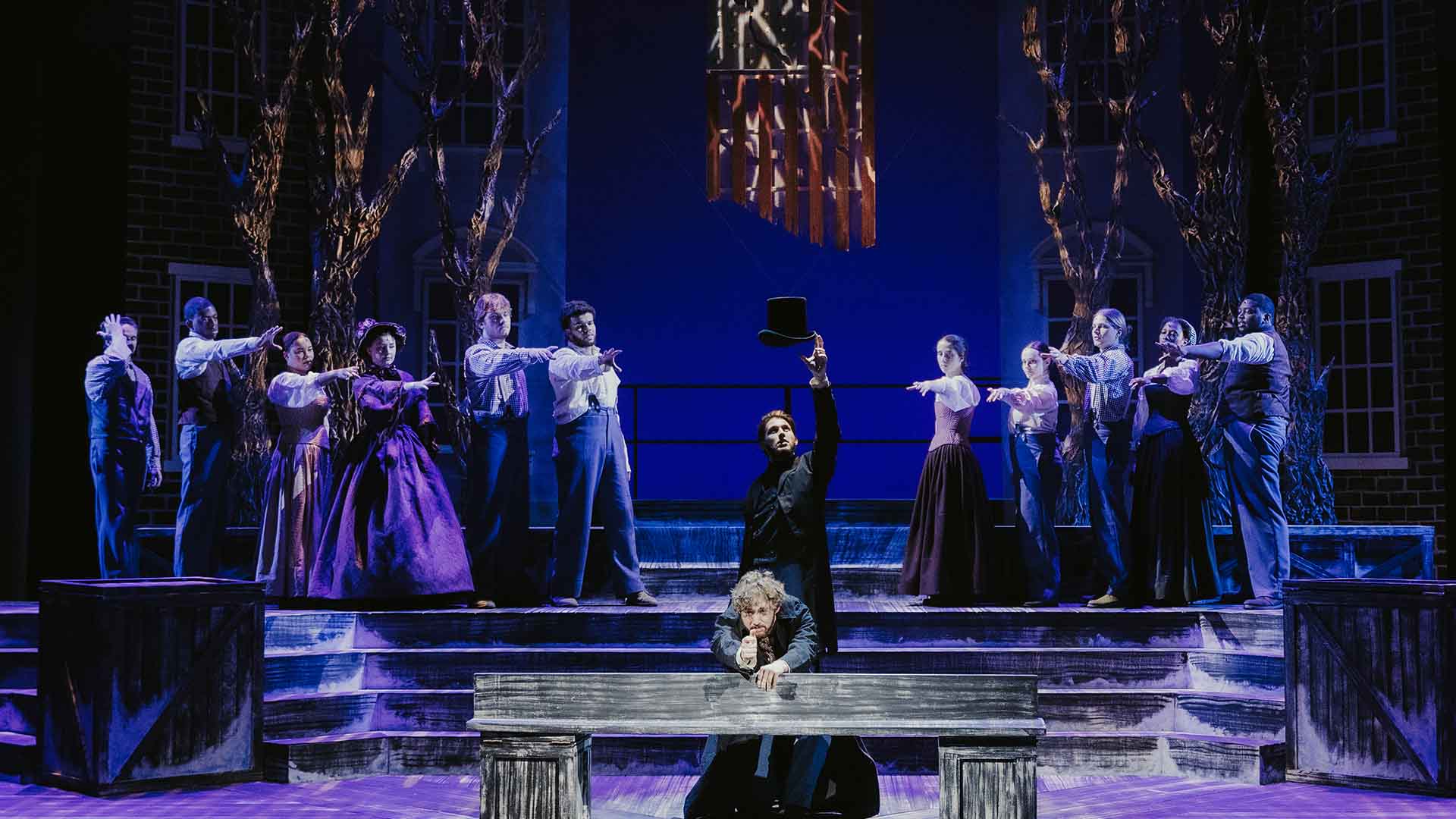News
Exit, Pursued by the Love of Teaching

While he was president, the late Father Daniel Gambet, OSFS, used to quip that “theatre to [Allentown College] was what football was to Notre Dame [University].”
If that is the case, one of our most effective and winningest coaches just left the playing field of the Pennsylvania Shakespeare Festival.
Patrick Mulcahy played sports and martial arts as a kid in Syracuse, New York, but was also drafted onto team theatre before college after seeing local productions. However, Mulcahy was not fully committed to acting at that point.
“My father worked at Syracuse University so I went there in 1982 majoring in acting with a minor in computer science—it was a mental coin flip which one to major in,” he says. “Until it became impossible to do both.”
The drama program at Syracuse demanded a singular commitment. Much like DeSales, Syracuse’s undergraduate acting program was complemented by a professional theatre, Syracuse Stage.
Syracuse also allowed Mulcahy as a junior to study abroad in London, which helped ignite his love of Shakespeare, a playwright who initially Mulcahy “didn’t get at all.” But learning in London and working with the plays invited him into all the Bard had to offer.
After earning his bachelor’s in acting in 1986, Mulcahy headed for New York City. His dream was to work in Shakespeare, and he was fortunate enough to land roles with The Public Theater, a New York City arts organization founded as the Shakespeare Workshop in 1954 by Joseph Papp, theatrical producer and director.
Mulcahy performed in Shakespeare in the Park in “Richard II” and “Henry IV, Part I,” where he not only understudied Prince Hal, but was the fight captain for the production.
After four years in New York and then pursuing opportunities in regional theatre, Mulcahy was asked to substitute teach college courses for one semester. And that is where, in his words, he fell in love with teaching, and then directing.
“Teaching and directing is all about the creative process that leads up to opening night, and in an undergraduate setting, it’s about facilitating growth in others. It’s all about making the invisible visible.”
Mulcahy next accepted a teaching fellowship back at Syracuse University and earned an M.F.A. degree in directing in 1995. He then taught at a college in Missouri for a year. Around the same time, former DeSales dance faculty member June Hines asked Mulcahy’s wife, Ellen Troy Mulcahy, a professional dancer who was a member of the Joffrey Ballet, Twyla Tharp Dance, and was an original cast member of the 1989 Tony Award-winning “Jerome Robbins' Broadway,” to teach a class at DeSales.
The Mulcahys fell in love with the area, and Patrick was able to accept a faculty position to teach acting in the DeSales division of performing arts, while Ellen then went on to teach at Muhlenberg College.
In 1996, Mulcahy became head of the acting program at DeSales, as well as teaching the undergraduate Shakespeare Touring Class. He also worked with the Pennsylvania Shakespeare Festival, including directing “The Tempest” in 1999. During his initial time with the Festival, Mulcahy got to know PSF well, working closely with its founder, Fr. Jerry Schubert, OSFS.
In 2003, Mulcahy assumed the role of producing artistic director of the Pennsylvania Shakespeare Festival. In that position, “with the assistance of an amazing team,” what the Festival has accomplished has been astonishing.
Under Mulcahy’s leadership, PSF attracted its first Tony Award-winning artists to its summer seasons, expanded its offerings to include musicals, productions in repertory, and as many as three Shakespeare plays per summer season.
The Festival doubled its attendance, served its one-millionth patron, quintupled its endowment, eliminated its debt, created a modest cash reserve, grew and diversified its Board of Directors and company, and secured its first and subsequent grants from the National Endowment for the Arts and other major arts grant makers.
Mulcahy also supported added accessibility programming, championed PSF’s education programs, increased the reach of its school tours, and created a Shakespeare for Kids production each season. Recently, PSF successfully pivoted in the pandemic to offer a broad range of indoor, outdoor, and virtual programming for the 2021 season.
There are also the many individual PSF productions of which Mulcahy is most proud, including “The Winter’s Tale” (2007), “Cyrano de Bergerac” (2008), and the behemoth musical, “Les Misérables” (2015).
“Patrick’s leadership of PSF is a fitting testament to his talents as a Renaissance man—a courageous strategist, thoughtful visionary, attentive fundraiser, effective manager, artist, motivator, and friend,” says PSF Board President Judy Harris. “Rarely have I witnessed so many successes of a leader during his or her tenure of any organization, be it a diversified for-profit business or a nonprofit arts organization.”
Asked why he is stepping down now, Mulcahy simply says it’s time and cites his love of teaching for wanting to return to the DeSales faculty full time.
In a press release announcing his departure, Mulcahy expanded: “Leading the Festival has been the honor of my life and has provided me with countless opportunities to continue to learn. A few years back, my wife and I began to talk about my returning to the faculty full time. The timing is right for us, and we will continue to champion PSF to ‘ascend the brightest heaven of invention’ as patrons and fans.”
Notre Dame football has nothing on us.
Photo caption: Patrick Mulcahy (center) directs actors Luigi Sottile (left) and Mairin Lee (right) in the rehearsal studio for the 2018 production of “Shakespeare in Love”





